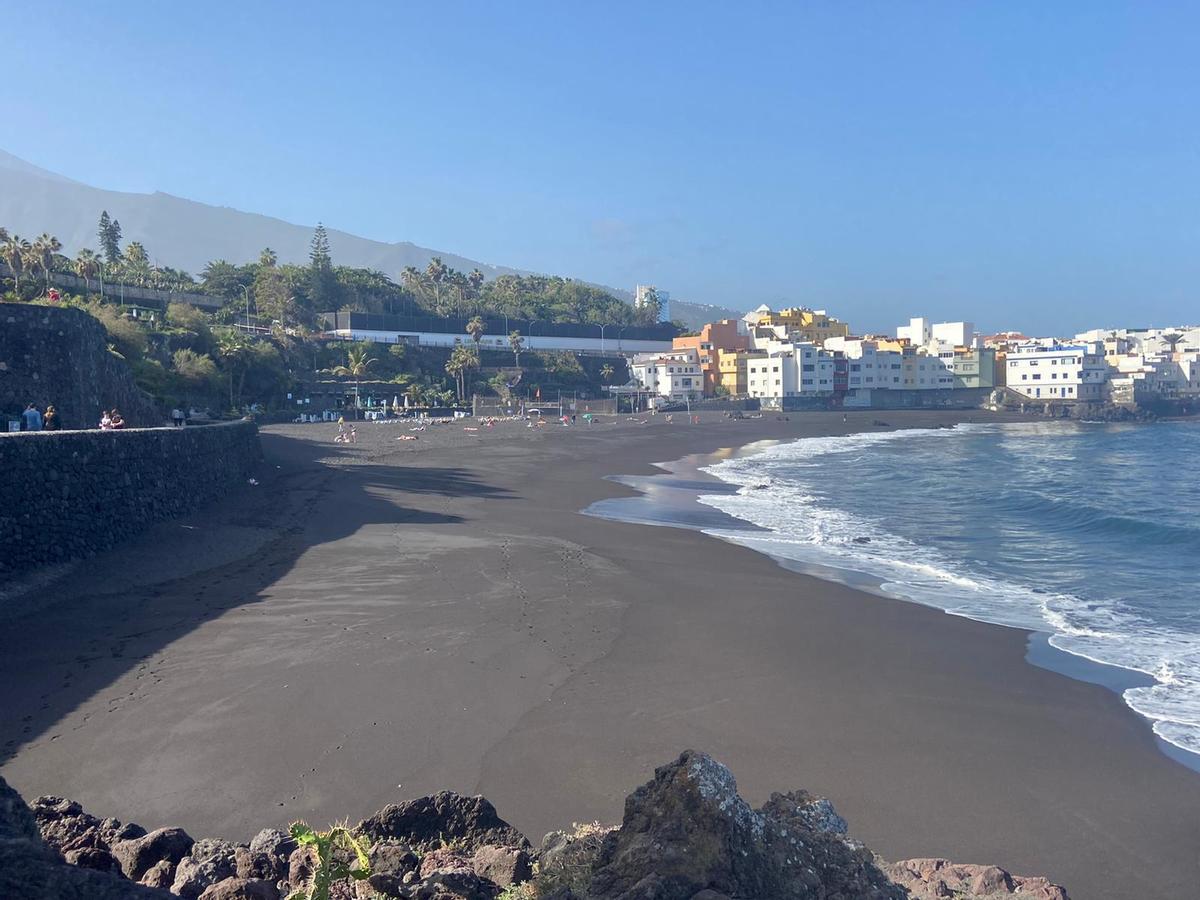The Puerto de la Cruz City Council, in line with the report issued by the General Directorate of Public Health, has imposed a ban on bathing for the general population throughout the Playa Jardín complex due to contamination with sewage, as reported by the local council.
In coordination with the mentioned service of the Canarian Government, the City Council will enhance water analyses, addressing any prescriptions and alerts from Public Health regarding the state of water quality based on these analyses, establishing a monitoring protocol to determine whether the analysis results allow for the lifting of this bathing ban at the beach.
To implement this measure, as of this Thursday, proper information will be provided at all beach access points with signage in various languages, establishing a temporary ban on bathing due to health protection reasons after confirming insufficient sanitary water quality or unsuitable for swimming due to contamination with sewage, detected following the analysis of the Escherichia coli bacteria, with epidemiological evidence that this situation can lead to gastrointestinal disorders through water ingestion, as well as other conditions such as acute respiratory infections and infections of the ears, eyes, nasal passages and skin.
Following receipt of the report issued by the Health Department of the Canary Islands Government and inquiries from the municipality in a meeting held this Tuesday with the Director General of Public Health José Fernando Díaz-Flores, attended by the island’s Environment Councillor, Blanca Pérez, and the manager of the Island Water Council, Javier Davara, it has been announced that this decision will be extended indefinitely and is a measure in response to the declining water quality that has been occurring, at least since 2016, in the Playa Jardín area, particularly in the past year 2024.
The Public Health report elaborates in detail on the state of waters in the different coastal areas of the municipality, highlighting the deterioration in the quality of Playa Jardín’s waters in recent years, shifting from excellent to only sufficient and imminently to insufficient, describing a gradual deficiency in water quality since 2016, according to Public Health, limited solely to the surroundings of Playa Jardín.
According to the same report, both Martiánez and San Telmo have excellent and good water quality, respectively, the latter showing an improvement in its state in the last two years, with no contamination incidents reported since September 2022.

Playa Grande, in Playa Jardín / El Día
A blow to Puerto’s image
The mayor, Marco González, expressed regret that this decision could harm the destination’s image in particular and the island in general, “but caution and prevention in light of this water quality situation demand that we inform and continue to act in the area in cooperation with other administrations.” He also expressed confidence that the situation can be reversed “if all administrations prioritise actions that are not only planned but also have the necessary funding.”
From the Community Welfare area, in collaboration with the city’s sanitation service concessionaire, after carrying out a general network improvement around the coastal area in 2022, a more comprehensive study will be conducted to detect other possible underlying causes contributing to the worsening water quality observed at Playa Jardín, with plans to connect 100% of homes and the food and retail sector in the entire Punta Brava area to the city’s general Sanitation network in the coming months, “analyzing in detail the entire coastal area with the neighbourhood, while also emphasising citizen awareness to engage their cooperation in a thorough house-by-house analysis.”
Furthermore, work is underway on a project to direct wastewater from La Vera and Las Dehesas directly to the Comarcal Depuradora Station, bypassing the Pumping Station at Playa Jardín.
Hence, the mayor also announced “that we are in contact with the Tenerife Island Council and its Island Water Council (CIATF) to urgently launch the project already informed by this City Council for over a year, regarding the comprehensive refurbishment of the outfall that, according to the project itself, has been experiencing a crack since at least the year” and which, according to CIATF, is awaiting the respective authorisations from the Coastal Services of the Government of Canary Islands since April 2023.
Nevertheless, the 2023 Comarcal Depuradora Surveillance and Control Programme complies with the sea discharge authorisation requirements according to documents provided by CIATF, affirming that the infrastructure meets the applicable environmental regulations, as stated by the Council that the infrastructure complies with the required environmental standards.
Furthermore, the municipality has requested a comprehensive report on the pumping stations, as well as a monitoring programme for the outfall managed by the Island Council to gain firsthand insight into the environmental situation of this area and the operation of the infrastructures under the Island Water Council.
Additionally, through the same urgent channel, it has been urged “to expedite as much as possible the processing and execution of the expansion of the wastewater treatment plant for which we secured funding of over 25 million in the previous term, which has been operating at capacity limits for years and is receiving increasing wastewater flow from neighbouring municipalities, Los Realejos and La Orotava,” stated the mayor, who is also awaiting the report from the Western Coast Service since April 2023 as requested by CIATF.
The Island Council will also expedite procedures to advance the annual crack monitoring of the outfall conducted each October to dismiss the possibility of this incident accelerating the issues facing the Playa Jardín area.















